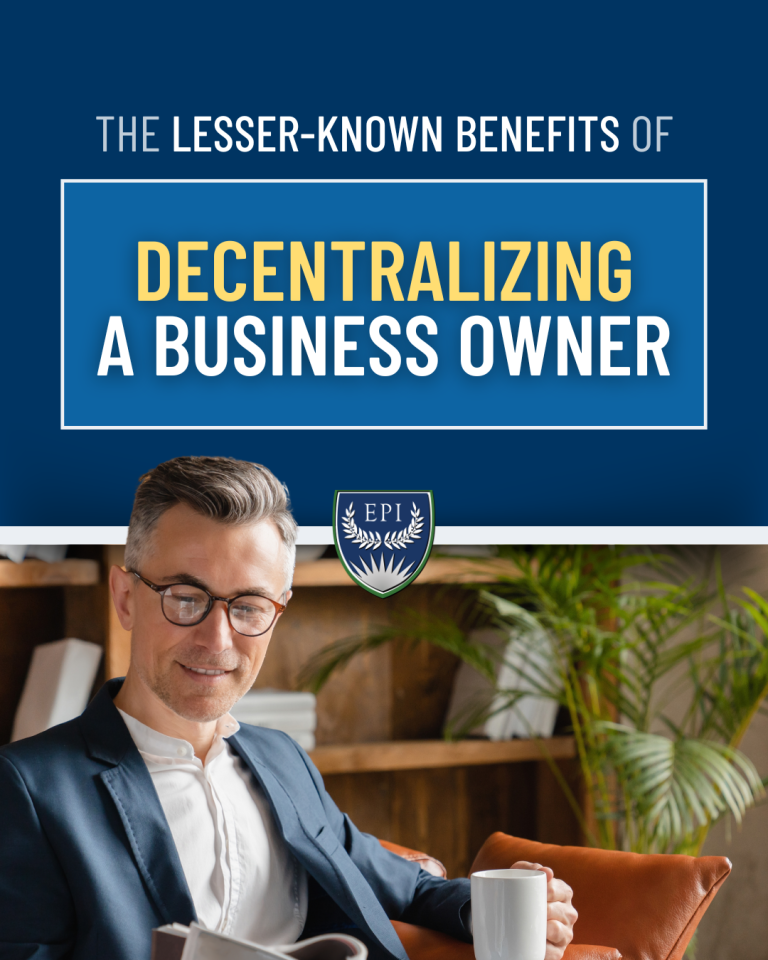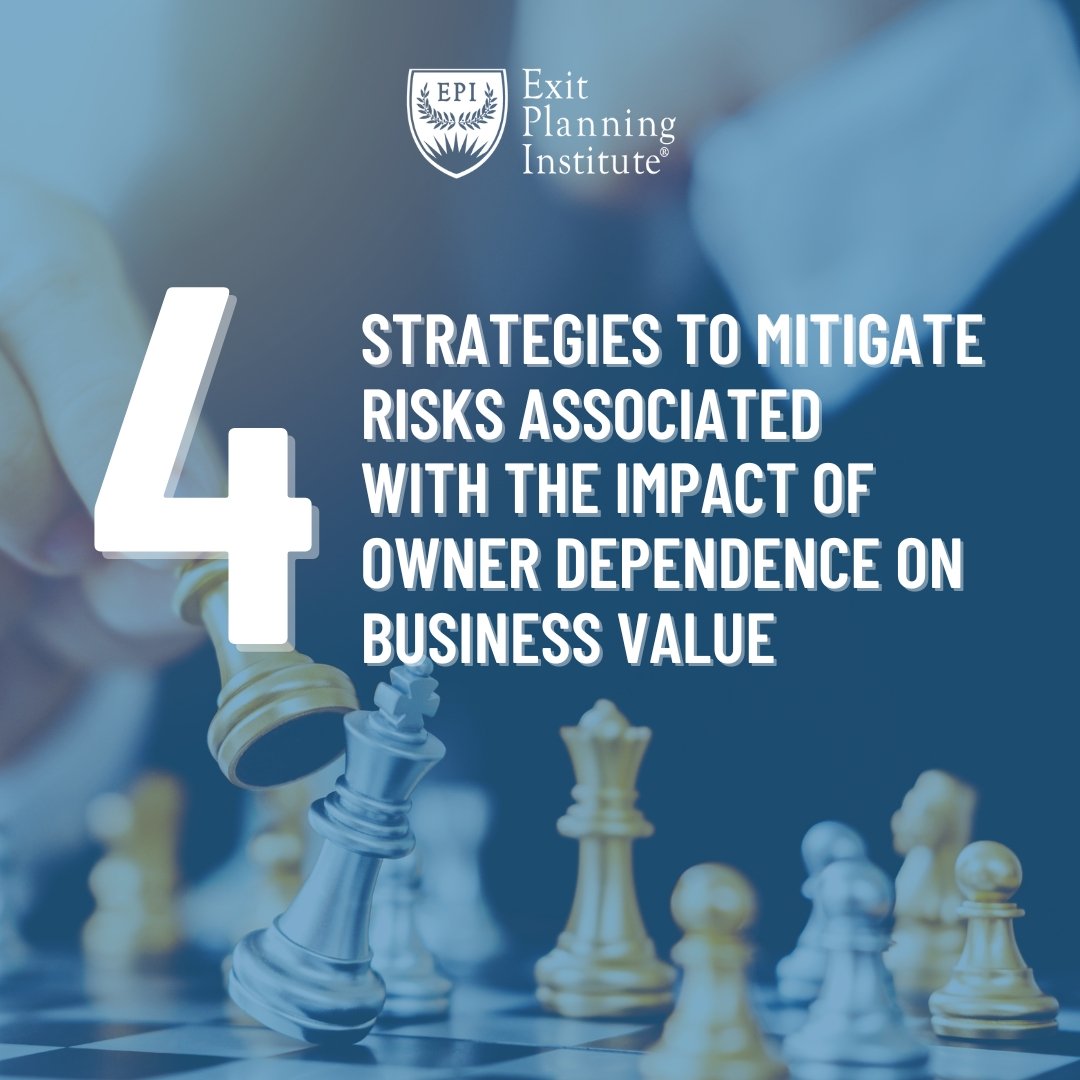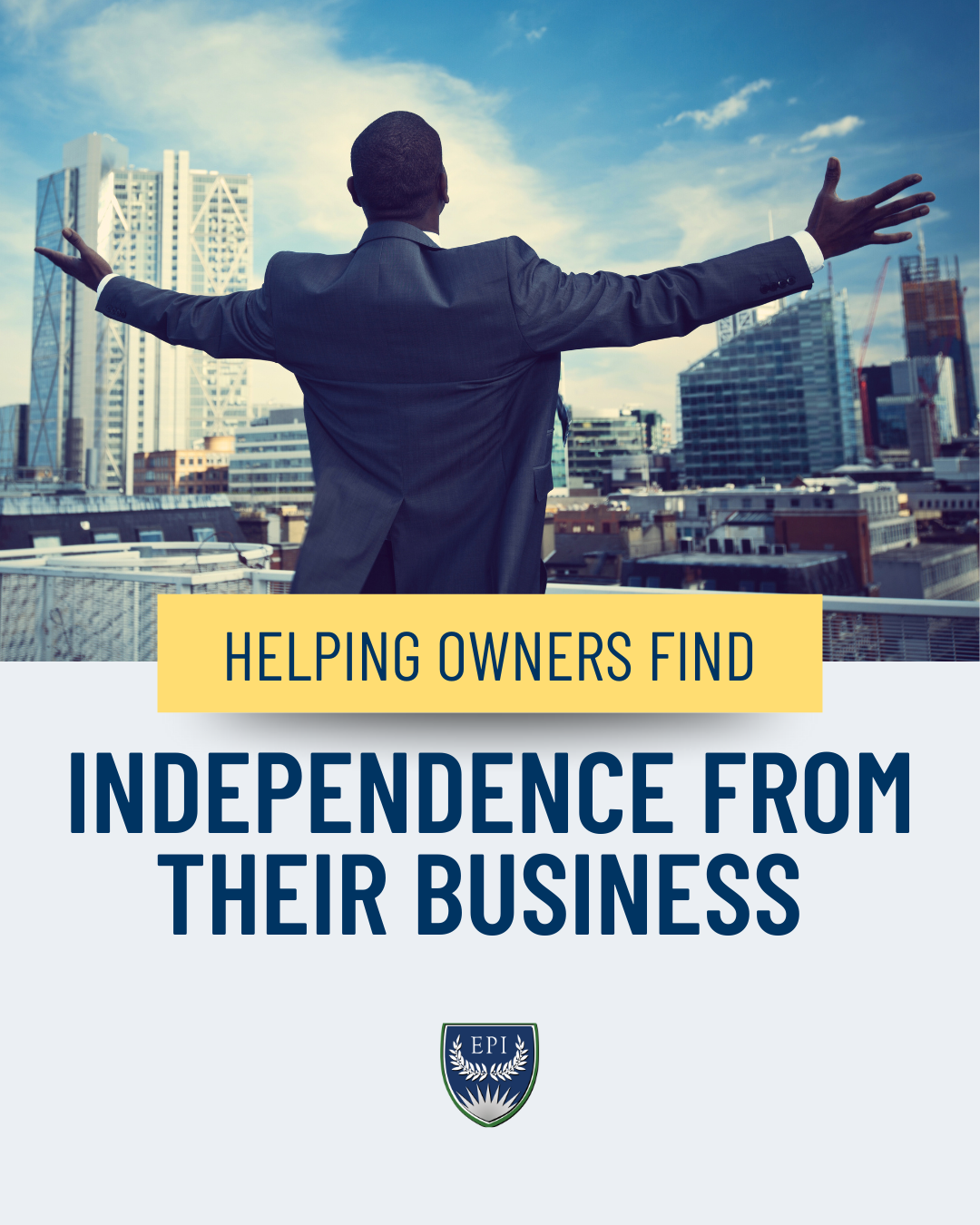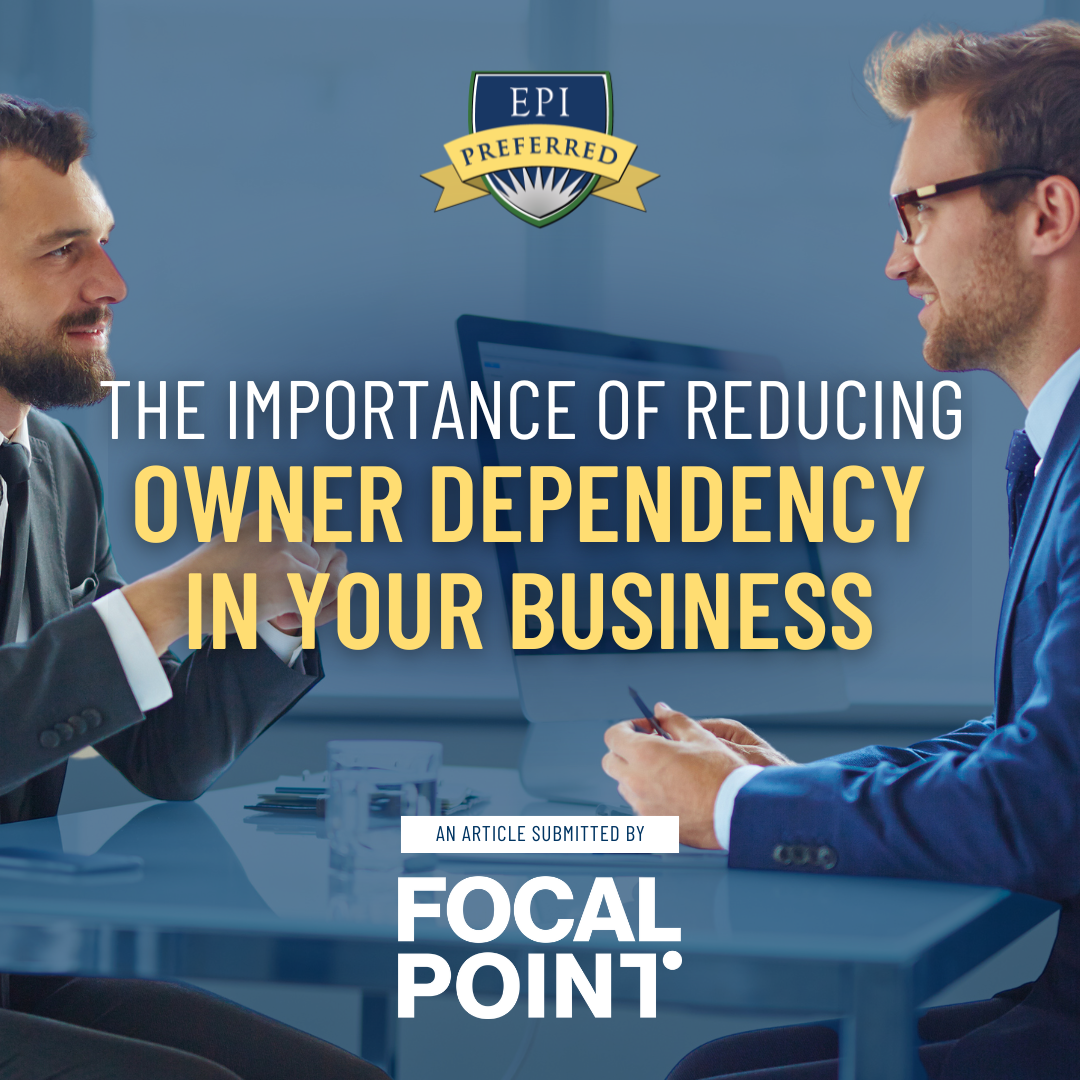
THE EXIT PLANNING BLOG
Keep up-to-date with exit planning, succession planning, industry trends, unique specialty insights, and useful content for professional advisors and business owners.
Share this
The Lesser-Known Benefits of Decentralizing a Business Owner
by Exit Planning Institute on December 25, 2025

You may have heard that decentralization can have a positive effect on the financial wellness and resilience of the company and increase both tangible and intangible value. In my experience, this phenomenon is not yet well-known to the public. And there are other, even lesser-known benefits of decentralization: It can have deep mental and physical health benefits to the owner and everyone in the company. Not only can the business become financially healthier, but the people in it become healthier from several aspects, which greatly improves organizational competitiveness, strengthens resiliency, and increases value.
A decentralized business owner is a secret weapon for a competitively strong and successful business. It’s not only important for a successful exit. The sooner an owner can decentralize, the more benefits the business stands to gain.
Decentralization builds organizational wealth by increasing team productivity
It also cultivates a culture of trust and loyalty, which builds resilience and long-term value.
From over 50 years of research, Gallup, HBR, Fast Company, and others have shown that people want to derive purpose and meaning from their work; they want their talents and skills developed; they do their best work when they’re challenged to improve; and they want a leader who can coach them to the next level. When people work in this kind of environment, they gain intrinsic motivation to do their work—the most powerful motivation there is.
Put a different way: when people are appropriately challenged at work, recognized for their strengths, and promoted to take on new responsibilities and meaningful tasks, they enjoy their work and are intrinsically motivated. They do better work, do more work, and take less sick days. This alone is wealth-building through increased productivity.
But there’s more.
When people enjoy their work and feel trusted by leadership to learn and become more, it builds loyalty. People are much more likely to stick with the company through the difficult times and bumps in the road. When there is less turnover, there is less financial loss through finding and training new people (estimated as 20% of the job's salary). It keeps knowledge assets in-house, and it builds organizational strength and resilience.
The much lesser-known benefit of owner-decentralization is the mental and physical health of the people in the company, which further builds wealth and value.
Passing on responsibility allows an owner more time for activities that support optimal performance and greater opportunity to be an exceptional leader. Most owners think devoting their entire life to their work is the route to the highest productivity levels. But it’s not. The opposite is true.
Look at it this way—
When you’re overworked, undernourished, lacking sleep, and without a meaningful social life or social support, it wears away at your ability to be a good leader. You lose your edge.
Sleep, healthy food, exercise, and socialization are the basics required for health and longevity, but also for optimal leadership performance. If you aren’t giving your brain what it needs for optimal performance, it means you aren’t as productive, you don’t make your best decisions, and you’re less able to remember conversations, find answers, be innovative and creative, and discover opportunities.
You also become inadequately equipped to lead your people well because you have less capacity to be calm, have patience, show compassion and empathy, and be balanced and fair.
As much as we think we can hide fatigue, exhaustion, sub-par nourishment, and the depression and anxiety that can come with these, we can’t. People feel and respond to the energy we give off. Even when we try our best to hide it, it shows up in ways we’re often unaware of. People start talking, wondering, and rumoring about what’s going on behind the scenes and what’s not being said. It ultimately erodes confidence in the company, diminishes trust, and breaks down communication because we aren’t able to be our best selves as leaders.
I’ve seen others in leadership roles experience this, and I’ve been there too: exhausted, undernourished, under-socialized, and under-supported. What it takes to make a shift is to be bold enough to take the actions required to step out of the business and trust others with the work, so you can re-fortify and strengthen your mental and physical performance so you can take optimal care of your business, and its people.
The Mental Aspect of Owner Decentralization
Your mental state, mood, mindset, emotions, relationships, and sense of purpose in life set off chemical cascades in your brain and body that profoundly affect your physiology. These chemicals impact inflammation, your immune system, sleep, digestion, reproduction, physical and mental recovery, and even your DNA. If your mental state is positive, it will have a positive impact on these physiological systems. If it’s negative, it will do the opposite.
We’ve just gone over how the choices an owner makes in the leadership role, as well as personally, determine how well the owner can maintain a calm, confident, positive, balanced mindset and persona. This is how the owner’s mindset and actions directly impact the team's mental state, which directly impacts their mental and physical health.
A physically and mentally healthy team is more productive, takes fewer sick days, has more positive energy, and gives more energy to their work. And in a time such as now, when people value mental and physical well-being more than ever before, they’re making decisions to stay with a company (or not) based on whether they have a healthy, engaging, growth-oriented environment.
In today’s society, a company culture that promotes mental and physical health wins the loyalty and commitment of the people, it keeps knowledge assets in-house, builds organizational strength and resilience, saves money, and increases in value.
The mental and physical health of everyone involved is improved when the owner gives responsibility and trust to the team. The action of passing on responsibility to others within the company directly feeds into an owner’s ability to take more time for practices that support optimal performance. This influences the organization’s culture and builds organizational resilience, competitiveness, and wealth through the health, engagement, productivity, and loyalty of the people in the organization.
Learn more from Luci Gabel in her Power Session from the 2022 Exit Planning Summit!
About the Exit Planning Institute
The Exit Planning Institute® (EPI) is the exit planning market leader, providing education, tools, resources, and the ecosystem to support professional advisors across the globe on all things Value Acceleration. EPI’s offerings include the Certified Exit Planning Advisor credential, the annual Exit Planning Summit, EPI Academy, an extensive Chapter Network, and more.
Related Resources
Share this
- Blog (548)
- CEPA (431)
- exit planning (249)
- CEPA community (188)
- Business Owner (175)
- Exit Planning Summit (99)
- EPI Chapter Network (89)
- Value Acceleration Methodology (81)
- Exit Planning Partner Network (76)
- EPI Announcement (50)
- Content (48)
- Webinars (37)
- Excellence in Exit Planning Awards (34)
- Marketing (30)
- 2024 Exit Planning Summit (28)
- 5 Stages of Value Maturity (26)
- Books (24)
- EPI Academy (24)
- EPI Team (22)
- Exit Planning Teams (22)
- Leadership (21)
- 2023 Exit Planning Summit (20)
- family business (20)
- women in business (19)
- Intangible Capital (18)
- Exit Options (17)
- Black Friday (16)
- CPA (15)
- Walking to Destiny (15)
- Chapters (14)
- State of Owner Readiness (14)
- charitable intent (13)
- Chris Snider (12)
- National Accounts (12)
- Small business (12)
- personal planning (12)
- Financial Advisors (11)
- Season of Deals (9)
- 5 Ds (8)
- About us (8)
- Podcast (8)
- Scott Snider (8)
- Insiders Bash (7)
- Christmas (6)
- Exit Planning Content Library (6)
- Case Studies (5)
- Owner Roundtables (5)
- Three Legs of the Stool (5)
- Value Advisors (5)
- financial planning (5)
- Awards (4)
- Circle of Excellence (4)
- EPI Thought Leadership Council (4)
- Exit & Succession (4)
- Five Ds (4)
- executive training (4)
- DriveValue (3)
- Owners Forum (3)
- author (3)
- forbes (3)
- Exit Is Now Podcast (2)
- Peter Christman (2)
- Veteran (2)
- Whitepapers (2)
- Annual Exit (1)
- Business Owners Forum (1)
- SOOR (1)
- business consultants (1)






